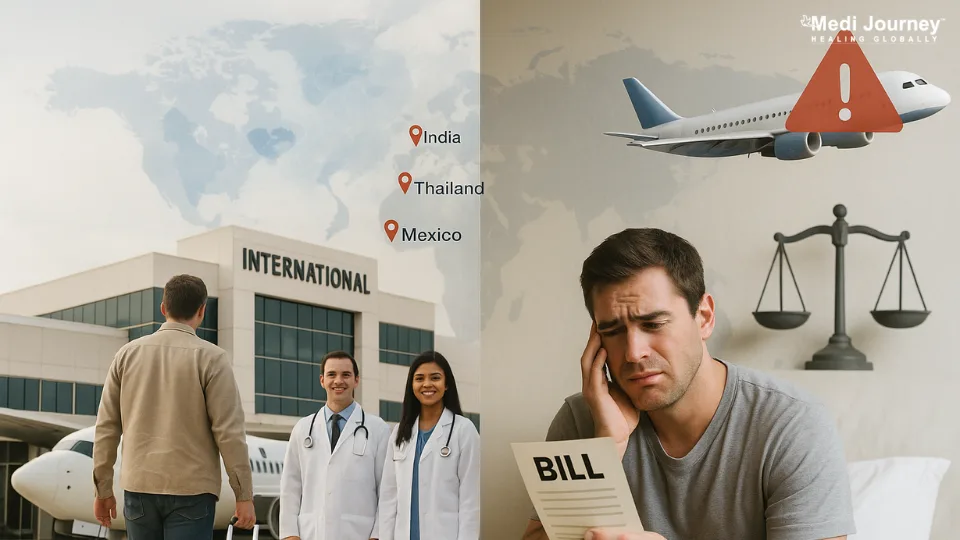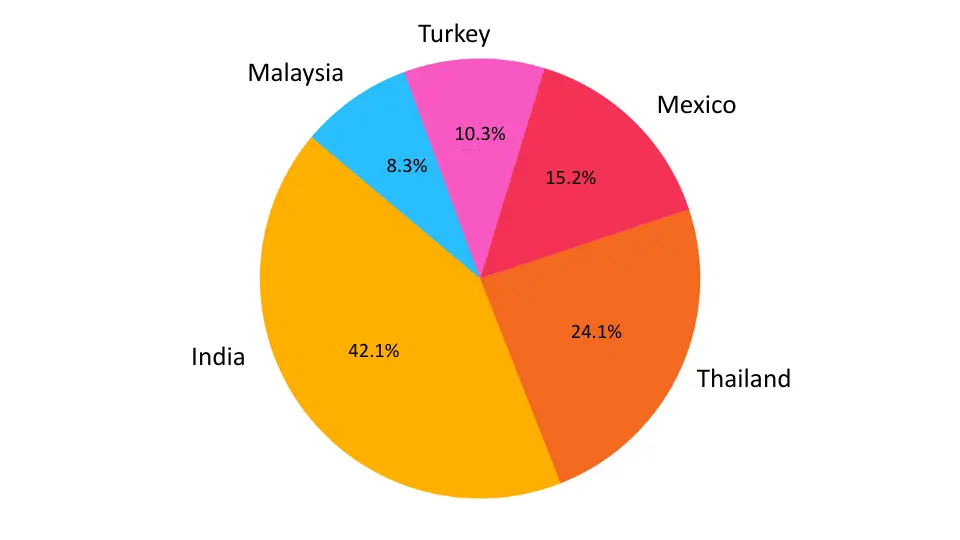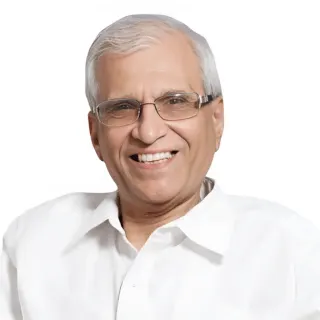Best Cosmetic & Plastic Surgeons in Indraprastha Apollo Hospital Delhi
 29 January,2026
Read More
29 January,2026
Read More
Enquire now in case of any assistance needed
 15 May,2025
15 May,2025

Mobility, global connectivity, and medical tourism are defining the world today. You’ll find several traveling abroad to seek top-notch medical services. Accordingly, medical tourism is also witnessing a full bloom these days.
From elective cosmetic tweaks to complex, life-saving procedures, more and more patients are boarding flights. They are looking for affordable, timely, and higher-quality healthcare overseas. To some, medical tourism is enticing. But is it the real scenario? Let’s understand that in today’s blog.
Surgery abroad has its own set of benefits, challenges, and risks. Let’s explore its dynamicity to ease your hassles in choosing the right option for your health or that of your loved ones.
Fill up the form and get assured assitance within 24 hrs!
Medical tourism, as the name suggests, is traveling for medicine. It is a journey to another country to seek quality medical, dental, or surgical care. The concept is not new; it has been popular for quite some time. With globalization, you and I can now access improved international healthcare standards. These are easily accessible with the correct documentation. Air travel has also fueled the growth of medical tourism.
Today, millions are crossing borders for medical procedures such as laparoscopic, dental, and major ones, such as cardiac procedures. Amongst the key destinations, the most popular for quality healthcare are India, Thailand, Mexico, Turkey, Costa Rica, Hungary, and Malaysia. These destinations are popular for their state-of-the-art hospitals, highly trained healthcare professionals, and affordability. Most of them usually charge a fraction of the healthcare service cost in Western countries.

The pie chart illustrates the most popular destinations for medical tourism in 2023. India emerges as the top choice, attracting 42.1% of medical tourists, likely due to its affordable treatment options, experienced doctors, and advanced healthcare infrastructure. Thailand follows with 24.1%, known for its quality medical services and hospitality. Mexico ranks third with 15.2%, offering cost-effective care close to the US. Turkey accounts for 10.3%, attracting patients with its modern facilities and skilled surgeons. Malaysia, with 8.3%, is also a preferred destination for its efficient healthcare services. Overall, the chart highlights the global spread of medical tourism and the countries leading in this sector.
People mostly choose to undergo surgery abroad due to the significant cost savings. Many hospitals have shorter waiting times. Moreover, they are well prepared to tackle advanced or specialized medical procedures, which may not be readily available in their home country.
Others combine the opportunity to seek necessary medical care with travel or recuperation in a new environmental setting. To many, this sounds quite sophisticated and appealing. Nonetheless, medical tourism allows patients and their caregivers to seek timely, high-quality treatment.
One of the most basic reasons the number of medical tourists is rising yearly is the underlying potential behind the ever-rising charges of medical treatment.
Procedures in countries such as India or Mexico can cost around 70–80% less than in the US or Western Europe. For example, a cardiac bypass costs over USD 100,000 in the US. The same procedure can often be done for 10,000–20,000 USD abroad. This overseas price includes the hospital stay charge and accommodation.
Countries like Canada and the UK have public healthcare services that can entail long waitlists for non-emergency surgeries. On the contrary, medical tourists can often schedule procedures abroad within days or weeks.
In countries with long waiting times for non-emergency situations, there is no need to wait months or years to get an appointment.
Not every procedure for every medical condition is available in every country. In such scenarios, patients and their caregivers may seek overseas healthcare services.
Some nations may have better alternatives for chronic dental illnesses with advanced dental technologies. Others may have sophisticated technologies for specialized
Medical tourism is also an excellent opportunity to indulge in a relaxing, vacation-like environment.
Certain countries offer additional recovery packaging, including resort-style settings for post-surgical care.
Several overseas hospitals have accreditations from international bodies such as the Joint Commission International (JCI). They have highly trained and experienced English-speaking doctors on their panels.
Countries such as India, Singapore, and South Korea are renowned for innovation and high standards in certain specialties.
Medical tourism offers numerous benefits, but it can also come with a few drawbacks and potential associated risks. Patients encounter several differences in medical standards and challenges with follow-up care. Understanding the cons and risks is essential for making an informed decision.
You won’t find the same medical standards across all countries. You will not see the same protocols followed at highly recommended foreign hospitals.
They differ in hygiene levels, treatment routines, staff training, etc. If you follow unfamiliar medical cultures, you may encounter mistakes or complications. You may even face challenges if you do not follow the protocols or there are communication gaps between you and your doctor.
In case of post-surgical complications, you may still be overseas. In such cases, follow-ups might be problematic.
At the same time, local physicians may not be familiar with the medical procedure you have received overseas. As a result, your ongoing care or addressing those complications becomes quite challenging.
Countries follow different patient rights, legal recourse, and malpractice rules. If something goes wrong, seeking compensation could be difficult or even impossible.
Furthermore, certain countries may have less stringent legal and ethical protocols for certain treatment types.
Long-haul travel soon after undergoing surgery overseas may increase the risk of developing blood clots or deep vein thrombosis. Other complications may also include infections and other post-surgical complications.
At times, traveling exposes patients to new pathogens, germs, or illnesses, as their immune systems are already compromised after surgery.
Initially, the cost of medical procedures may not cover all your additional expenses, such as follow-up appointments or medications.
It may not even cover extended stays following post-surgical complications or unexpected hospitalizations.
Medical tourism is growing rapidly, and international healthcare is flourishing more collaboratively in a standardized format. Some employers and insurers are even offering medical travel options as part of their medical packages.
Digital health records and teleconsultations are making cross-regional care coordination easier. Nonetheless, there have been many advances in medical tourism trends. In 2023, India welcomed approximately 6.1 million medical tourists, marking a significant rebound in its medical tourism sector post-pandemic. This surge underscores India's growing reputation as a hub for affordable and high-quality healthcare services.
Medical tourism is affordable and quick, and even offers superior pre-surgical, surgical, and post-surgical care. Yet, there are several associated risks and complications, in particular legal challenges. Due to all such factors, you cannot take medical tourism for granted. It demands proper planning and research. For some, savings and benefits outweigh most of your concerns, while for others, staying local as much as possible sounds better.
If you choose medical tourism, empower yourself with the correct information by asking the right questions and proceeding only with reputable service providers. Remember, your health and well-being are both precious and invaluable. Making an informed decision is the best possible investment you will ever make.
MediJourney guides you through every step of your medical tourism experience with personalized care and expertise. Our dedicated team handles all logistics from initial consultation to post-procedure recovery, connecting you with world-class healthcare at affordable prices.
We've built trusted relationships with accredited hospitals and specialists for surgery abroad across popular destinations, including Thailand, Mexico, and India. Unlike generic travel agencies, we specialize exclusively in medical travel, offering customized itineraries that balance your treatment needs with comfortable recovery and cultural experiences. Your health journey deserves specialized support. Contact us to see how MediJourney can make your medical travel seamless and stress-free.
Fill up the form and get assured assitance within 24 hrs!
B.Sc in Media Science from NSHM Knowledge Campus, Kolkata, 2019-2022
Suryani Dutta is an experienced content writer, specializing in healthcare and medical tourism. With a B.Sc. in Media Science from NSHM Knowledge Campus, Kolkata, she creates engaging, accurate, and SEO-friendly content that empowers patients to make info
Director
Orthopedic and Joint Replacement Surgeon
Dr. Sanjay Gupta is an experienced Orthopedics & Joint Replacement Surgeon specializing in various orthopedic procedures, including performing over 10,000 Joint Replacement Surgeries....
Senior Consultant
Medical Oncologist
Nanavati Super Specialty Hospital, Mumbai
WhatsApp UsSenior Director
Gynecologist and Obstetrician, IVF Specialist
Max Super Speciality Hospital, Shalimar Bagh, New Delhi
WhatsApp UsSenior Director
Gynecologist and Obstetrician, IVF Specialist
Max Smart Super Speciality Hospital, Saket, New Delhi
WhatsApp UsSenior Director
Gynecologist and Obstetrician
Max Smart Super Speciality Hospital, Saket, New Delhi
WhatsApp UsSenior Director
Gynecologist and Obstetrician
Max Smart Super Speciality Hospital, Saket, New Delhi
WhatsApp UsSenior Director
Gynecologist and Obstetrician
Max Smart Super Speciality Hospital, Saket, New Delhi
WhatsApp UsThe Art of Effective Communication
 27 January,2026
Read More
27 January,2026
Read More
 20 January,2026
Read More
20 January,2026
Read More
 16 January,2026
Read More
16 January,2026
Read More
 13 January,2026
Read More
13 January,2026
Read More
 09 January,2026
Read More
09 January,2026
Read More
Trusted by Patients
"I am Asim from Bangladesh and was looking for treatment in India for neuro. I visited many websites to get the complete information regarding the treatment but I was not satisfied as I was getting confused. In the meanwhile, one of my friends suggested I seek help from Medi Journey as he experienced his medical journey very smoothly and was satisfied with it. They have filtered the top 10 doctors as per experience, the success rate of surgery & profile, so it helps us to choose the best treatment in India. "
"For my knee surgery, Medi Journey guided me to BLK Hospital where I received exceptional care. The team's support and the expertise at BLK Hospital exceeded my expectations. Thank you Medi Journey for making my medical journey stress-free. "
"I came from Iraq for my granddaughter's eye surgery in India facilitated by Medi Journey, due to critical cases they advised us to get a second opinion from the different hospitals before going to surgery. Finally, we went to Fortis Escort Hospital, which helped us to get more confidence for diagnosis. Fortis Escort Hospital has the best eye surgeon team with the latest instruments. Thanks to all team members for providing a high-quality treatment in India at an affordable cost. "
"I came for my hair transplant in India, before coming I was so confused about choosing the best clinic and surgeon for me. But thanks to God one of my friends had a hair transplant in India through Medi Journey. He recommended me to go with them. I am completely happy with my experience with them. They were always very fast in their responses to me. the success rate of my hair transplant surgery is 100%."
"Artemis Hospital, suggested by Medi Journey, turned out to be a great choice for my treatment. The personalized assistance and medical care were exceptional. I'm grateful to Medi Journey for guiding me to a hospital that perfectly matched my needs. Highly recommended! "
"I came from Afghanistan for my treatment in India at Jaypee Hospital, Noida. I had a fantastic experience with Medi Journey. Kudos to them for their incredible support during my medical journey. They not only took care of all the logistics but also connected me with a fantastic healthcare team. Efficient, caring, and highly recommended for a hassle-free medical tourism experience."
"I am Adam from Kano, Nigeria, one of my friends from Nigeria was facilitated by Medi Journey, and he recommended us to go with them. I sent my all reports to them and within 48 hours they reverted with 4 options from different hospitals. They helped me to get a Visa letter from the hospital, arrange pick-up from the airport, and book a hotel for me. Their team is very honest and throughout our stay in India they are with us they are caring for us like his family members. BLK Hospital is the best hospital in India with a top surgical oncologist surgeon team, a very advanced OT, and a Radiotherapy department. I wish more success to Medi Journey. "
"Great experience at the Max Hospital for my spine surgery and was successfully done. I thank my neurosurgeon and his entire team. I recommended all of my country's people to Medi Journey for treatment in India, they choose the best hospital, the best doctors, and the best cost for patients."
"I came to India from Dhaka, Bangladesh for my father-in-law's cardiac surgery at Fortis Hospital. I was confused about choosing the best surgeon for him before coming, but their team helped me to choose the best hospital and best cardiac surgeon in India with very good cost and 100% success rate of surgery. I am very happy with the services, really they make my journey so comfortable that make me feel at home. Thanks again and I like people to choose "Medi Journey" as your travel guide. "
"I am Mohammad from Bangladesh came to India for my general health checkup. Medi Journey offers me the complete package including Pick-up from the airport, hotel services, and 24-hour assistance. They guide you to choose the best hospital in India, the best cost of treatment with top-most doctors and give you complete information about hotel booking, and pick-up from the airport before coming to India They have the best team to help. Always choose Medi Journey for your treatment in India."





